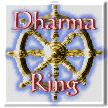

Dharma Ring Member SiteThis Dharma Ring site is owned byBev Thornton. Want to join the Dharma Ring? |
|---|
| [Skip Prev] [Prev] [Next] [Skip Next] [Random] [Next 5] [List Sites] |
The Idea of Deity in Buddhism
Buddhism is a non-theistic religion.
Non-theistic religions do not have gods as self-existing beings.
Theistic religions have gods or a god that are considered self-existing, being not dependent on human activity for existence.
In some non-theistic religions deities are existing beings brought into power by various means such as invocation or evocation rituals.
These beings are then considered to exist with an independent life of their own.
Buddhist deities do not have the attributes of self-existence or of independent existence, they exist only as mental phenomena.
In Buddhism, deities are merely imaginary beings existing only in the mind of humans.
The existence of the deity is entirely dependent on the activity of the human mind.
It does not exist in and of itself, it exists only within the attention and memory of humankind.
However, in folk-practice deities may sometimes be seen as self-existing gods. Such theistic interpretation is not a problem, it is merely another sort of phenomenon with which to work.
Buddhist deities represent many things such as qualities of being, aspirations, and historical figures. The statues, images and other representations of Buddhist deities are aids to meditation, visualization and other practices. The representations are often mistaken as being idols. This is not the case, they are merely practice devices.


Dharma Ring Member SiteThis Dharma Ring site is owned byBev Thornton. Want to join the Dharma Ring? |
|---|
| [Skip Prev] [Prev] [Next] [Skip Next] [Random] [Next 5] [List Sites] |